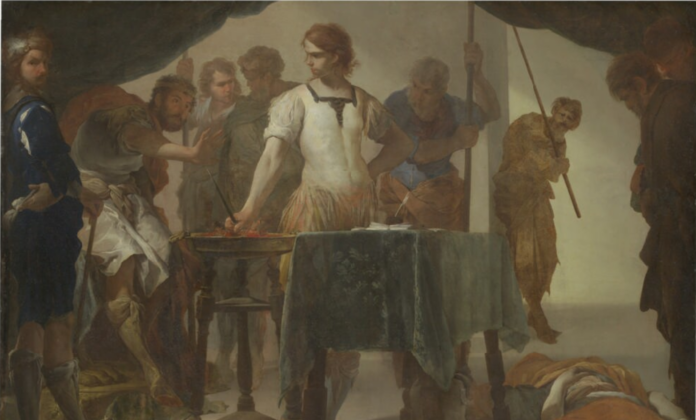
The false notion of the “UD Bubble”
When king Porsenna marched against the city of Rome, a young man named Mucius stole into his camp, intent on killing him. Mistaking another man for the king, Mucius slew him, fled and was apprehended. Brought before the enemy of Rome and threatened with torture by fire, Mucius thrust his hand into the flames, letting his hand burn. Overawed by his courage, Porsenna set him free and Mucius has been henceforth known as “Scaevola,” that is, “left-handed.”
It is difficult to describe the reaction that this story elicited when I told it to middle school students in a summer school Latin class that I taught this past June. It was something like Porsenna’s own: a vista was opened, as it were, upon the absolute, heroic disregard for self that a human being can evince. My students encountered something that they had not encountered before, something that was simply not part of their world.
As the students learned Latin across the month, they learned various parts of Roman history: Aeneas, the twins and the shewolf, Horatius Cocles, Hannibal’s elephants and Cicero’s death. None of them had heard this before— any of this. Not every student’s interest was equal, but for some, it was evidently enrapturing. For them, love of the classics was not something that had died; they simply had never known that there was such a thing as “the classics.”
No matter how intelligent students are, how hard they work or how well they succeed in the eyes of the world, it is not infrequent that their education—like the animal Caesar sacrificed before the Ides of March—lacks its own heart. One must make alive for these young people the ancient traditions of beauty and heroism that are the most fundamentally real stories of the world.
In these stories, vice discloses its emptiness and depravity, and virtue shines in its integrity. As someone who has tutored many struggling middle school students, I have seen in their wayward energies a thirst for a story of the world that is real. Understandably, this thirst can only be slaked by those who are themselves wellsprings of love for such reality.
Often, University of Dallas students accept unreflectively the claim that this university is a “bubble.” In general, this assertion seems to be a criticism. The implication is that the world beyond the borders of Northgate and Highway 114 is significantly different, where the things loved at the University of Dallas are not loved, and the things done at the University of Dallas are not done.
This is not wrong; the University of Dallas is free from a good deal of the goings-on of the wider world. The secondary implication of dubbing our university a “bubble,” however, is the requirement that one burst out of it. If one agrees with this requirement, it is all too easy to believe that what this university has to offer is merely temporary and that one must leave it in order to reach the “real world.”
Imagine, though, if we refused to view the university in this way. Think instead what the world might look like should we seek with all our energies to do precisely what the world fears, to expand this bubble, to capture people by it and to enclose them unrestrictedly within. How glorious it would be if we should capture others simply by our love for what is real.
Such a bubble-expansion would take no little effort. In fact, if we would desire to open to others an entirely new world, we would have to be willing to make significant sacrifices. We must burn our own hands. We must voluntarily lose part of ourselves, most especially our place and power in the so-called real world for a more lasting inheritance in what is real.
In practice, we must wholly commit to what happens at the University of Dallas, to reading all our books—all of them—both if one is a freshman tempted to look up lists of “Iliad” quotes or if one is a senior who never finished the “Iliad”. It is never too late for us to be opened up by what we have here.
Moreover, we must share the profound reality of what we encounter here with our family, our friends or anyone else we encounter. The gift of this education is not something to apologize for or to attribute to the influence of an obscure Catholic-classical “bubble.” It is something that can genuinely satisfy the hungry hearts of countless people.